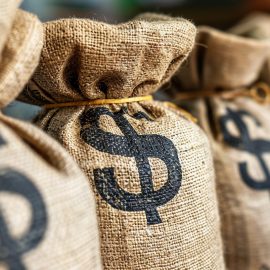
Are you looking for a friendly, easy way to learn more about personal finance? Where can you find personal finance resources you can trust?
Personal finance is…well…personal. Some want to get out of debt, some want to save for a big-ticket purchase, and others want to build serious wealth. No matter what your personal finance goal is, there are hundreds of resources to help you find the path that will get you there.
In this article, we’ve rounded up a list of the best resources, including blogs, books, and podcasts to help you navigate your unique personal finance journey.
Personal Finance Resources
With so much financial material out there, it can be difficult to pick out authoritative resources written by authors who don’t just preach theory but also offer actionable strategies to help you get to grips with your personal finances, pay off debt, and start saving for retirement.
That’s why we’ve scoured the web to round up authoritative personal finance resources, including books, blogs, and podcasts.
Best Personal Finance Blogs
There are tons of personal finance blogs out there, discussing all the ins and outs of the subject. The best personal finance blogs are both informative and actionable—they go beyond the common sense stuff and provide you with practical advice you can execute. Here’s our roundup of the best personal finance blogs, in no particular order, to help you take control of your finances.
Michelle, the author of Making Sense of Cents, used to work as a financial analyst, but now she is a self-employed blogger and solopreneur. She created Making Sense of Cents to keep track of her financial progress and help readers take control of their finances along the way. She blogs about saving, frugal living, and making money online.
Jim has been writing about personal finance for over 15 years and was featured in major media outlets including New York Times and Entrepreneur. He believes that personal finance professionals make money seem complicated on purpose, so he created Wallet Hacks to demystify money for the “laity” and help people aeffect positive change in their lives through smart money management.
The editorial team behind The Balance consists of over 50 highly educated writers with extensive qualifications and expertise in finance and money management. Their mission is to provide practical personal finance advice for any financial goal you might have. Whether you’re looking to save money, take out a mortgage, or pay off your student loan, The Balance’s extensive content library will have you covered.
The Dave Ramsey Blog is an all-around resource about everything to do with making your life easier: money, taxes, business, retirement, and more. They write extensively about personal finance, offering expert advice on things like paying off debt, taking out a mortgage, investing in S&P 500 Index Funds, saving for retirement, and more.
Founded by Bela Sokunbi, Clever Girl Finance is a leading personal finance educational platform for women in the United States. They provide a range of personal finance materials including free courses, articles, videos, and one-to-one mentor calls, all aimed at helping women take control of their finances and minimize the impact of socio-economic factors limiting them.
Mr. Money Mustache is on the mission to help people retire early by living frugally and investing in safe assets. As a retiree in his 30s, he writes from personal experience, and his advice is realistic and relatable. He also shares occasional case studies and stories from people reading his blog.
Page Jordan (also known as the Fun, Cheap, or Free Queen) is not your typical blogger. She doesn’t care about posting Pinterest-perfect pictures. She prefers to keep it real and “down-home.” She blogs about practical ways to live cheaply: sharing budgeting tips, frugal recipes, and money-saving tricks.
Living on a Dime by Jill, Tawra, and Make is a blog about how to grow rich by living on a dime. You’ll learn smart techniques for saving a little money here and there so that you can stay ahead of your bills, pay off debt, and live free of financial worries.
Best Personal Finance Books
Personal finance books vary dramatically in the scope of the material they cover. At the most basic level, you’ll learn the basics of personal money management: saving, budgeting, paying off debt, and planning for retirement. Some books take it further and teach more advanced material such as income diversification, passive income generation, investing, wealth-building, and more.
Here’s our selection of the best personal finance books from our Shortform library.
The Wealthy Barber is David Chilton’s bestselling guide to becoming financially successful by following a handful of simple, easy-to-understand principles. These principles are illustrated using a fictional story about a teacher, an auto plant worker, and a small business owner who seek financial guidance from a barber who’s become wealthy by following the lessons he imparts.
In Money: Master the Game, motivational speaker and life coach Tony Robbins argues that anyone can master money, achieve financial well-being, and create their dream lifestyle. In Robbins’ view, to master money means building an investing strategy that yields passive income for life and gives you the choice of when, where, and whether to continue working. Conversely, neglecting to master money means that you’ll always need to trade your time for money.
Most of us assume financial success depends on education and intelligence. But in his book The Psychology of Money, finance expert Morgan Housel presents an alternate hypothesis: The key to financial success lies in understanding human behavior. Housel posits that when you understand how emotions and beliefs influence your financial decisions, you’ll make better financial decisions.
Poor Charlie’s Almanack is a collection of Charlie Munger’s best advice given over 30 years, in the form of 11 speeches given as commencement addresses and roundtable talks. He covers a wide range of topics, including rationality and decision making, investing, and how to live a good life. You’ll learn why Charlie considers multidisciplinary learning vital to success, his checklist for investment criteria, and how to build a trillion-dollar company from scratch.
In The Barefoot Investor, Scott Pape offers guidance and a 10-step plan for how to manage your money so that you eliminate debt and build wealth. Though the plan is written for an Australian audience, the basic principles are universally applicable. Starting with establishing regular date nights with your significant other to discuss finances, then covering reducing debt and buying a home, the steps in this book will help you make informed money decisions.
In Your Money or Your Life, speaker Vicki Robin and financial analyst Joe Dominguez guide you through 9 steps to financial independence—not having to work for money. Unlike other personal finance books, this book is about more than budgeting. Rather, it’s about changing your entire relationship with money and, consequently, living a more meaningful life. You’ll learn to think of money as “life energy”—the time and energy you dedicate to paid work—and use this new mindset to align your spending habits with your values, purpose, and dreams.
In The Total Money Makeover, Dave Ramsey lays out simple steps for freeing yourself from debt and setting yourself up for success: following a monthly budget, buying only what you can afford, eliminating consumer debt, saving for emergencies, investing for retirement and your kids’ college education, and paying off your mortgage. Intended for everyone—from high earners to people with thousands of dollars in debt—Ramsey’s common-sense financial advice put you in control of your money and your life.
Robert Kiyosaki wants you to forget the traditional path from college to a good job to a stable retirement because it doesn’t exist anymore. In his first follow-up to the international bestseller Rich Dad, Poor Dad, Kiyosaki implores you to make your money the way the rich do: by developing assets. Using the simple concept of “Cashflow Quadrants,” Kiyosaki teaches you which types of income lead to financial freedom, and which don’t.
Secrets of the Millionaire Mind
In Secrets of the Millionaire Mind, self-made millionaire T. Harv Eker reveals the difference between the way rich people and poor people think and feel about money. Eker argues that these thoughts and beliefs impel you to take actions that either move you toward financial success or away from it—if you’re not happy with the state of your finances, it’s because your unproductive thoughts and beliefs about money hold you back from the financial success that you want. According to Eker, you can dramatically improve your finances by taking conscious control of your thoughts and adopting a rich attitude that will inspire you to take new actions that lead to your financial success.
In I Will Teach You to Be Rich, Sethi helps you cut through the noise of conflicting and overly technical financial advice, get past your own hang-ups around money, and take small steps toward a “rich life”—whatever that looks like for you. You’ll learn how to use credit cards wisely, choose the right bank accounts and investment accounts, plan out your spending, and ultimately create a financial system that grows your money automatically.
In The Millionaire Next Door, authors Thomas J. Stanley and William D. Danko skewer the myths about how (and where) most millionaires live, and what it takes to become one. Their extensive research published in 1996 identified the sometimes surprising characteristics and habits shared by many millionaires. For instance, millionaires are often bargain shoppers (they buy used cars and off-the-rack clothing), pay only a small percentage of their wealth in income taxes, and shun the lavish lifestyles we often associate with being rich.
Best Personal Finance Podcasts
Listening to investing podcasts is great if you like consuming content on the go. Here’s our roundup of the best personal finance podcasts to follow in 2022.
Named as the best podcast by The New York Times and Time Magazine, So Money With Farnoosh Torabi brings you insightful perspectives, inspiring stories, and personal finance tips from financial experts, authors, and entrepreneurs.
In Afford Anything, host Paula Pant talks about deliberate spending—aligning your spending with the lifestyle you value most. She sits down with millionaires, entrepreneurs, early retirees, authors, etc., exploring ways to make better financial decisions in light of the current economic climate.
Do you dream of financial freedom? Then, you must check out Joshua Sheats’s Radical Personal Finance podcast. Sheats is a financial planner who teaches people how to build a feasible plan for financial freedom in 10 years or less. You’ll learn about financial planning techniques, lifestyle design, investing, business, and much more.
Bigger Pockets Money with Scott Trench and Mindy Jensen is a bi-weekly podcast aiming to help you reach your financial goals by bringing you raw and honest personal finance stories and actionable advice from financial experts and entrepreneurs. Whether you want to get out of debt, diversify your income stream, or start building wealth, this podcast will set you on the right path.
As the name suggests, Couple Money Podcast is all about helping couples manage their mutual finances. In each episode, host Elle Martinez sits down with financial experts, journalists, and real-life couples who share tips and tools to help couples plan their financial futures.
In Deeper Than Money, Chloe Elise shares her wisdom on how to finally take your finances into your own hands and begin your journey towards financial freedom. Learn how to pay off debt, grow your savings, and start investing for financial security. When it comes to personal finance, it’s hard to find a topic she doesn’t cover.
Final Words
Managing your personal finances is one of the most important life skills you could develop, especially in this day and age of almost endless choices. Many people spend money impulsively, without much regard for how unnecessary purchases take them further and further away from their long-term security. If you’re serious about taking control of your finances, we’ve got you covered with the best personal finance resources, including books, blogs, and podcasts.






